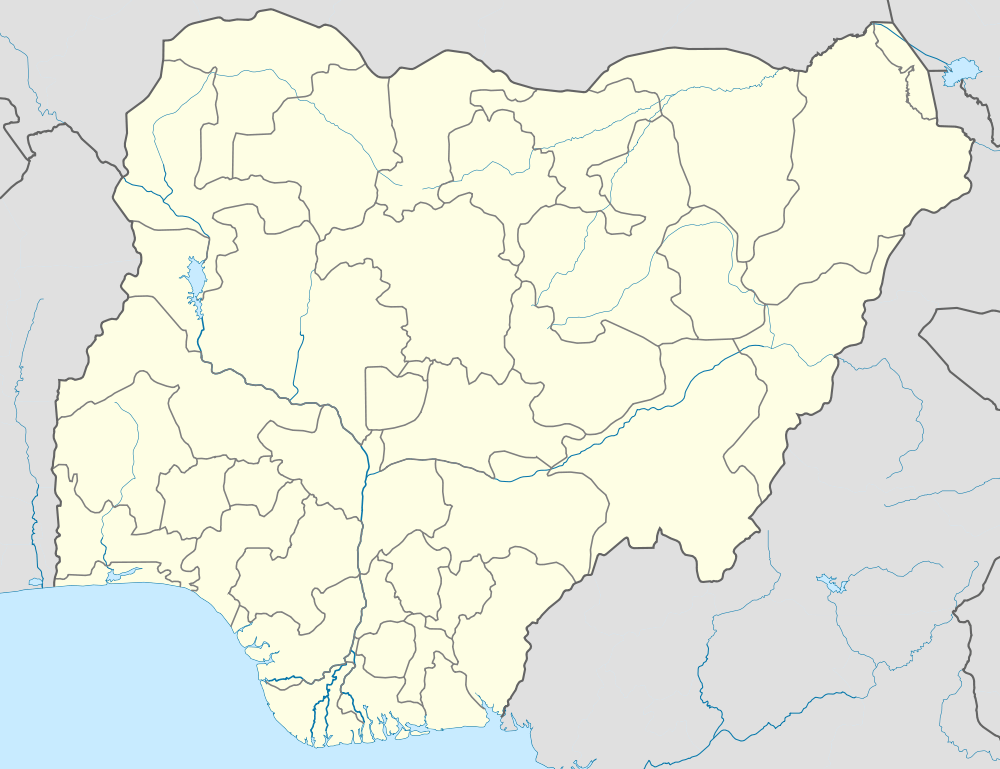Nsugbe
| Nsugbe | |
|---|---|
 Nsugbe Location in Nigeria | |
| Coordinates: 6°16′N 6°49′E / 6.267°N 6.817°E | |
| Country |
|
| State | Anambra State |
Nsugbe is a town in Anambra East Local Government Area, Anambra State, Nigeria.
Location
It is bordered by Onitsha on the west, Nkwele-Ezunaka, Ogbunike, Umunya to the southwest, River Anambra to the north across which lies such towns such as Anam and Asaba. On the east are towns such as Umuleri, Aguleri, Nando, Nteje, Awkuzu, Igbariam, and Achalla.
Origin
Oral tradition has it that the first settlers to arrive at Nsugbe were the descendants of Eri who emigrated from Ifite and Igbezulu Aguleri after the death of their father and settled at Okpuno Enugu, an area on the outskirt of modern Nsugbe. However, Enugu the leader of the group was recalled to Aguleri on the death of Enini, his brother who it appeared succeeded his father. His descendants remained and were later joined by other immigrants from Agulu and Nri to establish the present day Enugu Nsugbe.
The second group of immigrants according to the same tradition came in large numbers from Awka area, Igala and the Mid-West (Delta State). They founded Offianta village. The founders of Nnadi village according to the same tradition arrived at Nsugbe as a result of their attempt to flee from the ada war. This war ravaged the whole of Igboland and left a lot of places desolate. They settled among Offinta people until a dispute erupted in 1903 that made them to appeal to the people of Amumu for a piece of land upon which they established Nnadi, their village. The next were the group that came from Awka-Achalla-Nri axis. They are linked with Amagu village. The next group of settlers came predominantly from the Igbo-speaking parts of Delta state. They lived with the Edo and later crossed the Niger-Anambra flood plains to settle at the eastern bank of the Niger. Some of them settled at Nsugbe forming villages like Agbalagbo, Akpalagu and Ogwuari.
Some of the immigrants from the mid-west were linked to Eze-Chima who fled Benin in the 15th century. The Founders of Ogwuari came from Ogwuashi-Ukwu in Delta State, a town not so far from Benin. Having crossed the Niger, they settled between the Niger and Anambra rivers with their Anam neighbours for many years, owning farmlands and fishing ponds like Ojeli, Akpatayama, Aribo and Onono. They eventually crossed the Niger and Anambra Rivers and settled between Ugbo Eke and Akpaka (present day Onitsha forest reserve) handing over their lands and fishing ponds to Anam people as custodians with an oath to act as care takers. The last to arrive were the Ogbunike people. They came from Ogbunike, a town in present day Oyi local government area of Anambra State. On arrival they attached themselves to Ogwuari village and have since been completely absorbed.
Nsugbe heart land being fertile was a major recipient of these groups of immigrants and as warriors and hunters those from the mid-west soon occupied an enormous area of land stretching out into other areas. They eventually met the other immigrants at a place called Okuki-izu. This square has since that time been used for purposes of meetings. Therefore the coming together and the settlement of these immigrants resulted to the foundation of what is today known as Nsugbe Which must have occurred over 500years ago. Nsugbe in the past can be divided into predynastic and dynastic periods.
The predynastic period marked the time when Nsugbe was a confederation of villages and was governed by three separate groups: the Okala Okwule, the Umuotu and Otuogene. The Okala Okwule was a body of elders of the villages that made up Nsugbe while members of the Umuotu were drawn from energetic and able bodied men in the town. The Otuogene on the other hand comprised a body of old women folk. The dynastic was marked by the period when kingship or monarchical institution was introduced into Nsugbe by Ogwuari people with the kings being called Obi. The list of Kings: Obi Ezepue, Obi Ezenwigbo, Obi Nwaobi, Obi Eke, Obi Uzoka, Obi Itava, Obi Somukwu, Obi Ovili (Ofili), overthrown in 1875. Obi Ovili was the last of the Obis to reign. He followed a line of succession, an exclusive preserve of the Umu-Obi family of Ogwuari. His last child was Princess Nno, born in 1875 and died in 1975. This was followed by a period of crises of leadership as a group that called themselves Ndi-Eze emerged.
The word eze is the Igbo word for king. They were therefore a class of multiple kings and were responsible for the overthrow of Obi Ofili. This was the situation when the British colonial administration penetrated Igbo land which ushered in the era of warrant chiefs. Maka was the first to be appointed and he took charge from 1904. He was replaced by Obi Meze while he was still alive in 1924.Obi Meze died in 1935. After the death of Obi Meze there was a period of interregnum until Nsugbe people summoned J.N. Anyansi the 1st to rule them in 1946. He was recognized as a second class chief in 1962 and ruled until his death in 1967. Thereafter Nsugbe entered into another period of crises as another group called the Oba society emerged. Their main concern was to challenge the multi-eze society. It was also about this period that J.C. Anyansi was appointed as the chief of Nsugbe, currently Chukwuemeka Osili is chief of Offianta, one of the numerous villages which form Nsugbe.
Modern status
Nsugbe over the years has progressed. Presently there is a Nwafor Orizu College Of Education, and Nsugbe people are involved in business, government and politics, banking, the civil service, academia, and industry.
References
- Ogbumuo E, N, in his B.A History thesis Monarchy In Nsugbe, University Of Lagos, 1982 page 9,quotes Isichei, E's History Of Igbo People, MacMillian Press, London 1977, page 96.